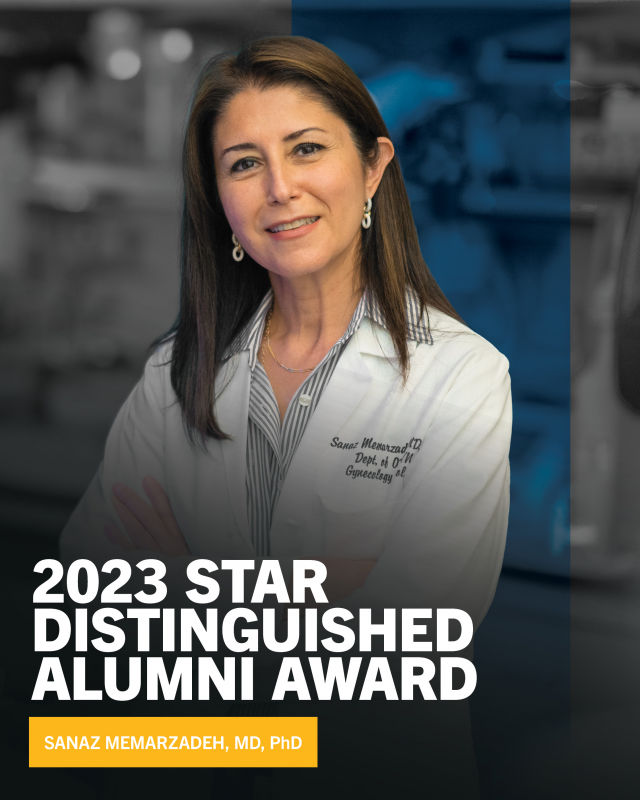2023 STAR Distinguished Alumni Award - Sanaz Memarzadeh, MD, PhD

Sanaz Memarzadeh, MD, PhD
Professor, David Geffen School of Medicine at UCLA
Director, G.O. Discovery Lab
About Dr. Memarzadeh
Dr. Memarzadeh is a surgeon-scientist and professor at UCLA. She directs an independent highly energized research laboratory, the G.O. Discovery Laboratory, focused on advancing care and research for women impacted by gynecologic cancers. Following her medical studies, she embarked on her OBGYN residency at UCLA.
During this time, her dedication to providing exceptional care to women with gynecologic cancers grew, and she recognized the pressing need for basic scientific research to improve current therapies in this domain.
Consequently, she pursued a clinical fellowship in gynecologic oncology while simultaneously honing her skills as a scientist. Driven by her passion, Dr. Memarzadeh earned her PhD in the lab of Dr. Owen Witte and successfully completed her fellowship training within a span of eight years. She embodies the role of a woman surgeon-scientist, dedicating herself to both patient care and scientific discovery. Her primary objective is to advance the treatment approaches for women diagnosed with gynecologic cancers. She diligently serves patients at UCLA and the West Los Angeles VA Hospital, delivering care alongside her commitment to scientific progress.
What research question(s) are you most interested in solving? What steps have you taken to solve it?
A major current clinical challenge is that despite surgery and administration of chemotherapy, the majority of epithelial ovarian cancers recur. My career goal is to understand and prevent recurrence of epithelial ovarian cancer. To understand and solve this challenge, we are taking a three-pronged approach, 1) Understanding characteristics of tumor cells that may be responsible for recurrence of disease and 2) Testing cell based immune therapy approaches that can target those tumor cells as well as immune suppressive cells that promote their growth and 3) evaluating small molecules and combination treatments with chemotherapy that may lead to eradication of these cells. We hope to take our cell-based immunotherapy approaches into clinical trials in the near future.
Why did you decide to pursue the physician-scientist pathway through the STAR Program at UCLA?
As a resident training at UCLA and taking care of ovarian cancer patients, I was truly inspired by the courage of women who were treated with ovarian cancer and still had to face recurrence of this disease despite best medical efforts and available treatment options. I made it my life mission to help devise better treatments for these patients through research and clinical practice. I pursued the STAR program to ensure I had adequate training to tackle these challenging clinical and scientific questions.
Can you share a memorable experience from when you were a trainee in the STAR Program?
Developing a lifelong mentorship relationship with my mentor Professor Owen Witte who was instrumental in training me as a scientist. I am grateful to have ongoing scientific collaborations with him and his team to this day. I am also grateful for his continued mentorship.
How did the STAR Program impact your professional development as a physician-scientist?
The STAR program provided me with sufficient tools necessary to tackle clinically challenging questions. With this training I was able to devise sound hypotheses and experimental approaches to test those hypotheses and contribute knowledge aimed at improving lives of women impacted by cancer.
What have been some of the most rewarding aspects of your research career thus far?
The ability to provide hope for women impacted by ovarian cancer thanks to the incredible collaborations with scientific and clinical colleagues here at UCLA.
What advice would you share with the next generation of physician-scientists?
Persevere. Do not allow anyone to impede your progress. You are our future.